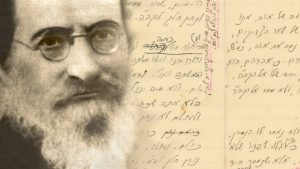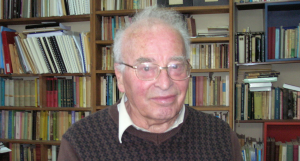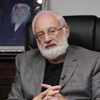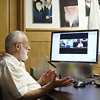My new article on Linkedin “The Legacy of a Spiritual Giant”

He knew the clock was ticking; he knew they had to move to Israel; he told the Israeli Prime Minister how Israel can truly be independent; and he dedicated his life to helping the Jewish people and all of humanity. This week, 67 years ago, Yehuda Ashlag, known as Baal HaSulam, the greatest kabbalist in modern times, and among the greatest of all time, passed away and left us with a legacy of unconditional love for his people, for all people, and for all of creation. He also left us with books and a road map that can help us become like him.
It was 1921. Ashlag, a brilliant Dayan [judge in Jewish Orthodox court] in Warsaw, the “capital” of Diaspora Judaism, who was appointed to this venerable position when he was only 19 years old, had now been excommunicated for several years. But he didn’t mind the extreme hardship he and his family endured because of it. His only focus was the fate of his people and the fate of the world.
A few years back, he realized that Europe was headed for extreme and lethal antisemitism. He tried to warn his fellow Warsaw Jews, but the Orthodox leadership prevented his voice from being heard. When he insisted, they terminated his position as a Dayan, severed their connections with him, and instructed the entire Jewish community to ignore him. In those days, a boycott was a life threatening situation since one had to rely on the community for work, housing, education, and provision. Without them, one was at the mercy of the Poles, and they were no Jew-lovers.
But Ashlag kept on trying. He struck a deal to purchase 300 wooden shacks from Sweden and a place for them to be erected in Palestine. He even managed to secretly convince 300 Jewish families to move there and escape a bitter fate in Europe. Alas, the Orthodox leadership discovered his plan and convinced all 300 families to remain in Poland. We will never know how many of them, if any, survived the Holocaust.
But in 1921, something happened. Ashlag realized that it was time to go. By then, he had been studying Kabbalah for many years, and he has reached a level where he transcended his own teacher. In such a state, there was nothing more to keep him in Poland. That same year, he and his family moved to Jerusalem and he began to write profusely.
Ashlag’s writings testify that he was not only a great kabbalist, but revolutionary global thinker who understood the intricacies of human nature. Using his keen insights, he was able to predict what would happen in Israel and in the world, and tried his best to change things for the better. He was an avid Zionist not for the sake of conquering the land, but in order for the Jewish people to carry out its duty to the world: to set an example of unity and love of others that he knew the world would desperately need.
He did not settle for writing. He met with every influential person in the county at the time and tried to convince them that sovereignty in and of itself is not enough, that if Israel is to thrive, it must set an example of unity and mutual responsibility. He begged those leaders to establish education toward unity above all differences, and establish the society based on people’s care for one another, and not expect matters to work themselves out.
He spoke several times with David Ben Gurion, Israel’s first Prime Minister, Moshe Sharett, Israel’s second Prime Minister, Haim Arlosoroff, head of the Political Department of the Jewish Agency, Member of Knesset (Israel’s parliament) Moshe Erem, and with many others. He spared no effort. In the 1930s, he wrote a series of essays that detailed his views as a global thinker. In his essays, “Mutual Responsibility,” “The Freedom,” and especially in “The Peace” and “Peace in the World,” Ashlag detailed how humanity can thrive in prosperity and peace.
But Ashlag was first and foremost a kabbalist. It was through his profound understanding of creation, acquired through his study of Kabbalah, that he became such an astute thinker. His dream was for everyone to be as wise as he was, and that everyone would care about humankind as much as he did.
To achieve this, he wrote two monumental commentaries on the most seminal compositions in the wisdom of Kabbalah. His first feat was a six-volume commentary on the writings of the ARI, particularly Tree of Life and Eight Gates. In his commentary, which he titled The Study of the Ten Sefirot, he interpreted the writings of this great 16th century kabbalist so that contemporary people could relate to them and understand them.
His second, and most illustrious achievement, was the writing of an elaborate commentary on The Book of Zohar, complete with four introductions that tell the reader how to understand this vital text. In his commentary, which he titled the Sulam [Ladder], he translated the Aramaic text of The Zohar into Hebrew, and interpreted the meaning of the words so that readers could see how the book speaks not about the physical world, but about spiritual processes that all Kabbalah students go through. As a token of respect, Rav Ashlag later became known as Baal HaSulam [Author of The Ladder] after the name he had given to his commentary.
Humanity has yet to discover what this greatest of men has given us. He begins his introduction to The Study of the Ten Sefirot with the following words: “At the outset of my words, I find a great need to break an iron wall that has been separating us from the wisdom of Kabbalah since the ruin of the Temple [2,000 years ago] to this generation.”
But why should we study Kabbalah? A few paragraphs later, Baal HaSulam answers this question himself: to find the meaning of life. In his words, “If we set our hearts to answer but one very famous question, I am certain that all these questions and doubts will vanish from the horizon, and you will look unto their place to find them gone, meaning this indignant question that the whole world asks, namely, ‘What is the meaning of my life?’ In other words, these numbered years of our life that cost us so heavily, and the numerous pains and torments that we suffer for them, to complete them to the fullest, who is it who enjoys them?”
In his treatise, “Time to Act,” Baal HaSulam shares his great yearning for everyone to know what Kabbalah is truly about. “For a long time now,” he writes, “my conscience has burdened me with a demand to come out and create a fundamental composition regarding the essence of … the authentic wisdom of Kabbalah, and spread it among the nation, so people will come to know and properly understand these exalted matters in their true meaning.”
Thankfully, today his writings, and the writings of all the kabbalists, are only a click away. At Kabbalah.info, we have made all the material available for free so everyone can study.
But Baal HaSulam’s work is not done. Humanity is suffering and more divided than ever. We, who value his sacred legacy, must pick up where he left off and pass on the wisdom of truth, love, and unity to all.
Filed under: Baal HaSulam, New Publications, Spiritual Teacher - No Comments →
 Question: Why did Baal HaSulam write and then burn his manuscripts?
Question: Why did Baal HaSulam write and then burn his manuscripts?














